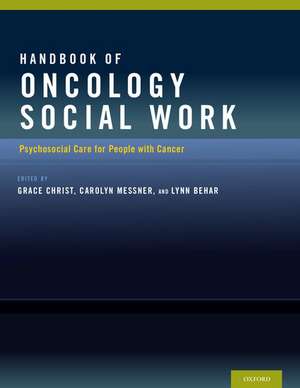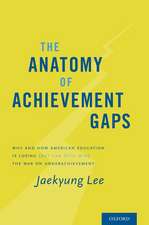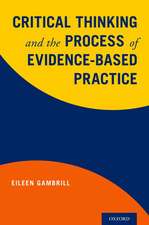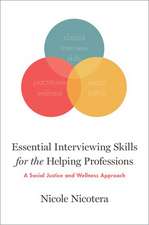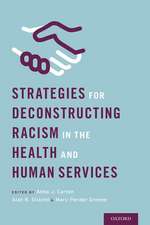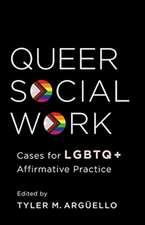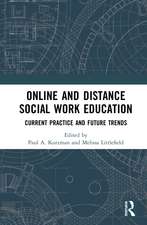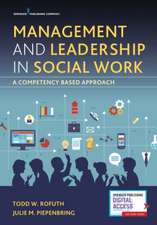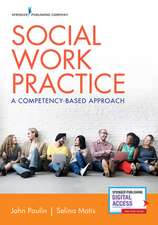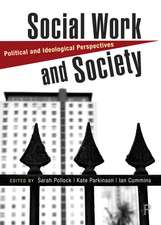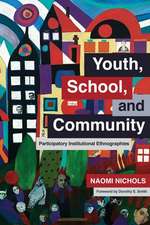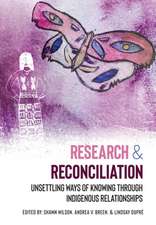Handbook of Oncology Social Work: Psychosocial Care for People with Cancer
Editat de Grace Christ, Carolyn Messner, Lynn Beharen Limba Engleză Hardback – 9 apr 2015
Preț: 1236.40 lei
Preț vechi: 1605.71 lei
-23% Nou
Puncte Express: 1855
Preț estimativ în valută:
236.59€ • 252.99$ • 197.26£
236.59€ • 252.99$ • 197.26£
Carte disponibilă
Livrare economică 28 martie-11 aprilie
Preluare comenzi: 021 569.72.76
Specificații
ISBN-13: 9780199941926
ISBN-10: 0199941920
Pagini: 872
Dimensiuni: 216 x 279 x 46 mm
Greutate: 2.2 kg
Editura: Oxford University Press
Colecția OUP USA
Locul publicării:New York, United States
ISBN-10: 0199941920
Pagini: 872
Dimensiuni: 216 x 279 x 46 mm
Greutate: 2.2 kg
Editura: Oxford University Press
Colecția OUP USA
Locul publicării:New York, United States
Recenzii
I have had the privilege of working with many social workers who have been of enormous help to patients and their families, and at the same time sustained me. Any book that advances their role and recognition is a plus.
For decades, the Institute of Medicine has released one report after another lamenting the gap between the recognition that cancer affects the whole person, and our ability to address the human needs of the growing population of cancer survivors and their loved ones. With the inaugural publication of the Handbook of Oncology Social Work, help is at hand. This long-awaited volume, written by pioneers in the field of oncology social work, provides a wealth of evidence-based information on how to deliver cancer care for the whole person in a rapidly evolving health care delivery system Kudos to the editors of and many contributors to this outstanding volume, a must read for anyone practicing in oncology.
While there have been significant medical advances and increasing numbers of cancer survivors, the human adaptive challenges to this disease have in fact become more complex and long term. Social workers are at the forefront of developing, implementing, and evaluating a broad range of psychosocial services for this population. The Handbook of Oncology Social Work offers educators as well as new and seasoned professionals a wealth of evidence based information, practice wisdom, and the lived experiences of patients and families to undergird their teaching and provision of care. It is an indispensable text and resource for all educators and practitioners in health care.
The Handbook of Oncology Social Work is an exceptional, state-of-the-art book that clearly addresses the key issues confronting oncology social workers today. The book emphasizes social work's strong values for sharing decision-making, helping the most vulnerable and distressed, and reducing health disparity. It is an essential resource for social workers and other professionals who want to provide high quality, evidenced-based care to people with cancer and their family members.
The inaugural Handbook of Oncology Social Work is truly a social work masterpiece. The editors have gathered the experts in the field to compile the most recent evidence-based data in terms of screening, assessment, and interventions that can provide the greatest benefit to cancer patients and their families.
The Handbook of Oncology Social Work is a comprehensive manual addressing the multiple roles and evolving practice of this specialty. By providing psychosocial support beginning at diagnosis and palliative care through the end of life, navigating financial issues and ongoing changes in the health care system, and helping simplify the complexity of the new era of genomic profiling and targeted therapies, the oncology social worker plays a critical role in enabling patients to optimize quality of life while dealing with the emotional, social, physical and financial burdens of cancer. This handbook is an invaluable resource for the entire cancer community.
It is extremely rare for there to be a textbook that is simultaneously so comprehensive, well researched and clinically practical. [This handbook] is clearly the new gold standard for oncology social work. But to say that this textbook is limited to social workers or cancer alone grossly misses the point. The clinical, educational and research implications of this monumental accomplishment are relevant for other health care professionals and chronic illnesses. The editors and authors represent the encyclopedic wisdom and diversity of thinking of many of the foundational leaders in the field and across disciplines. Significantly, there are also provocative contributions by many evolving leaders in psychosocial oncology which deeply enriches this 'must own' treasure trove of compassionate expertise.
The Handbook of Oncology Social Work comes at a perfect time. Since beginning my career 23 years ago, I have seen the challenges of serving oncology patients and their families become exceedingly complex, with rising incidents of cancer, many more individuals living with cancer, and increasing numbers of survivors, many of whom, however, experience a reduced quality of life linked to treatment side effects. The breadth and depth of the learnings covered in the Handbook is a brilliant blending of the history, knowledge, wisdom, and experiences of the nation's oncology social workers integrated with the stories and voices of patients and families. The Handbook is the manual that every oncology health care team should read.
The scope of practice covered in this handbook is essential for any oncology social worker, whether they are new to the field or an experienced practitioner. The handbook will be required reading for all social work interns and fellows. The sheer number of topics and authors reflects the great advances we have made in providing psychosocial care for people living with cancer and their families over the last three decades. It is written in language that is easily transferrable to practice, which will be helpful to social work practitioners and others across the continuum of care in oncology. The authorship of this book is astounding! Congratulations to the many contributors and editors of this wonderful handbook.
Oncology social workers have played a central role in developing the science and art of psychosocial care for people affected by cancer. The size and scope of this inaugural edition of the Handbook of Oncology Social Work is a testament to the numerous important contributions oncology social work has made to the field of psychosocial oncology in the areas of clinical care, education, research, program development, and health policy. Although the focus is on oncology social work, I am certain that professionals in all other fields of oncology that involve patient and family care will find it to be an invaluable resource.
This inaugural Handbook of Oncology Social Work codifies in exemplary fashion the wisdom, clinical practice, and art of the oncology social work profession. This outstanding publication highlights the variety of challenges experienced by people living with and undergoing treatment of cancer, cancer survivors, their caregivers, and the bereaved. It provides an overview of multiple topics and excellent clinical practice guidelines for all oncology disciplines. I congratulate the editors and authors for their vision in creating this exceptional book which is an invaluable resource in psychosocial oncology and for all health care professionals.
In this rapidly changing health care environment, the comprehensive Handbook of Oncology Social Work is a valuable resource for social workers and members of the health care team who are working to meet the complex needs of people with cancer and their loved ones. Recognition of psychosocial needs and their impact on outcome has led to mandates requiring assessment of social, emotional, and financial concerns and protocols for addressing these needs. Social workers are on the front lines in implementing these new quality measures and in developing programs to assist a growing population. The Handbook defines and describes the range of interventions used by social workers to meet 21st-century needs and will become the cornerstone of oncology social work practice.
This comprehensive handbook written for oncology social workers is an important resource for anyone who works with people with cancer. It is practical, informative and organized in a manner that makes it easy to use. The nonmedical needs of a person with cancer are vast and always changing, this handbook strives to address them all. As an attorney in this field, this handbook will further my understanding of the psychosocial and practical needs of my clients.
The Handbook of Oncology Social Work is truly historic. It is the first book that provides both a comprehensive and deep sense of the myriad roles and values of social work in addressing the complex issues associated with the number two cause of death in the United States. Whether seasoned or new to the field, social workers will find this volume a constant companion to increase their knowledge, skill, and influence on the health care system. Its framework is essential social work-addressing the biopsychosocial and environmental factors affecting cancer patients, their families, and the settings in which they receive services and benefits. Beyond social workers, its interdisciplinary focus should speak to physicians, nurses, and other health care providers, as well as family and professional advocates across the continuum of care.
Persons with cancers are confronted with a deluge of information and decisions about their illnesses and the impact on their lives. Oncology social workers play a crucial role in helping patients and caregivers navigate this sea of choices. The Handbook of Oncology Social Work encompasses the breadth and depth of expertise and compassion that oncology social workers bring to individuals and families living with cancers.
For decades, the Institute of Medicine has released one report after another lamenting the gap between the recognition that cancer affects the whole person, and our ability to address the human needs of the growing population of cancer survivors and their loved ones. With the inaugural publication of the Handbook of Oncology Social Work, help is at hand. This long-awaited volume, written by pioneers in the field of oncology social work, provides a wealth of evidence-based information on how to deliver cancer care for the whole person in a rapidly evolving health care delivery system Kudos to the editors of and many contributors to this outstanding volume, a must read for anyone practicing in oncology.
While there have been significant medical advances and increasing numbers of cancer survivors, the human adaptive challenges to this disease have in fact become more complex and long term. Social workers are at the forefront of developing, implementing, and evaluating a broad range of psychosocial services for this population. The Handbook of Oncology Social Work offers educators as well as new and seasoned professionals a wealth of evidence based information, practice wisdom, and the lived experiences of patients and families to undergird their teaching and provision of care. It is an indispensable text and resource for all educators and practitioners in health care.
The Handbook of Oncology Social Work is an exceptional, state-of-the-art book that clearly addresses the key issues confronting oncology social workers today. The book emphasizes social work's strong values for sharing decision-making, helping the most vulnerable and distressed, and reducing health disparity. It is an essential resource for social workers and other professionals who want to provide high quality, evidenced-based care to people with cancer and their family members.
The inaugural Handbook of Oncology Social Work is truly a social work masterpiece. The editors have gathered the experts in the field to compile the most recent evidence-based data in terms of screening, assessment, and interventions that can provide the greatest benefit to cancer patients and their families.
The Handbook of Oncology Social Work is a comprehensive manual addressing the multiple roles and evolving practice of this specialty. By providing psychosocial support beginning at diagnosis and palliative care through the end of life, navigating financial issues and ongoing changes in the health care system, and helping simplify the complexity of the new era of genomic profiling and targeted therapies, the oncology social worker plays a critical role in enabling patients to optimize quality of life while dealing with the emotional, social, physical and financial burdens of cancer. This handbook is an invaluable resource for the entire cancer community.
It is extremely rare for there to be a textbook that is simultaneously so comprehensive, well researched and clinically practical. [This handbook] is clearly the new gold standard for oncology social work. But to say that this textbook is limited to social workers or cancer alone grossly misses the point. The clinical, educational and research implications of this monumental accomplishment are relevant for other health care professionals and chronic illnesses. The editors and authors represent the encyclopedic wisdom and diversity of thinking of many of the foundational leaders in the field and across disciplines. Significantly, there are also provocative contributions by many evolving leaders in psychosocial oncology which deeply enriches this 'must own' treasure trove of compassionate expertise.
The Handbook of Oncology Social Work comes at a perfect time. Since beginning my career 23 years ago, I have seen the challenges of serving oncology patients and their families become exceedingly complex, with rising incidents of cancer, many more individuals living with cancer, and increasing numbers of survivors, many of whom, however, experience a reduced quality of life linked to treatment side effects. The breadth and depth of the learnings covered in the Handbook is a brilliant blending of the history, knowledge, wisdom, and experiences of the nation's oncology social workers integrated with the stories and voices of patients and families. The Handbook is the manual that every oncology health care team should read.
The scope of practice covered in this handbook is essential for any oncology social worker, whether they are new to the field or an experienced practitioner. The handbook will be required reading for all social work interns and fellows. The sheer number of topics and authors reflects the great advances we have made in providing psychosocial care for people living with cancer and their families over the last three decades. It is written in language that is easily transferrable to practice, which will be helpful to social work practitioners and others across the continuum of care in oncology. The authorship of this book is astounding! Congratulations to the many contributors and editors of this wonderful handbook.
Oncology social workers have played a central role in developing the science and art of psychosocial care for people affected by cancer. The size and scope of this inaugural edition of the Handbook of Oncology Social Work is a testament to the numerous important contributions oncology social work has made to the field of psychosocial oncology in the areas of clinical care, education, research, program development, and health policy. Although the focus is on oncology social work, I am certain that professionals in all other fields of oncology that involve patient and family care will find it to be an invaluable resource.
This inaugural Handbook of Oncology Social Work codifies in exemplary fashion the wisdom, clinical practice, and art of the oncology social work profession. This outstanding publication highlights the variety of challenges experienced by people living with and undergoing treatment of cancer, cancer survivors, their caregivers, and the bereaved. It provides an overview of multiple topics and excellent clinical practice guidelines for all oncology disciplines. I congratulate the editors and authors for their vision in creating this exceptional book which is an invaluable resource in psychosocial oncology and for all health care professionals.
In this rapidly changing health care environment, the comprehensive Handbook of Oncology Social Work is a valuable resource for social workers and members of the health care team who are working to meet the complex needs of people with cancer and their loved ones. Recognition of psychosocial needs and their impact on outcome has led to mandates requiring assessment of social, emotional, and financial concerns and protocols for addressing these needs. Social workers are on the front lines in implementing these new quality measures and in developing programs to assist a growing population. The Handbook defines and describes the range of interventions used by social workers to meet 21st-century needs and will become the cornerstone of oncology social work practice.
This comprehensive handbook written for oncology social workers is an important resource for anyone who works with people with cancer. It is practical, informative and organized in a manner that makes it easy to use. The nonmedical needs of a person with cancer are vast and always changing, this handbook strives to address them all. As an attorney in this field, this handbook will further my understanding of the psychosocial and practical needs of my clients.
The Handbook of Oncology Social Work is truly historic. It is the first book that provides both a comprehensive and deep sense of the myriad roles and values of social work in addressing the complex issues associated with the number two cause of death in the United States. Whether seasoned or new to the field, social workers will find this volume a constant companion to increase their knowledge, skill, and influence on the health care system. Its framework is essential social work-addressing the biopsychosocial and environmental factors affecting cancer patients, their families, and the settings in which they receive services and benefits. Beyond social workers, its interdisciplinary focus should speak to physicians, nurses, and other health care providers, as well as family and professional advocates across the continuum of care.
Persons with cancers are confronted with a deluge of information and decisions about their illnesses and the impact on their lives. Oncology social workers play a crucial role in helping patients and caregivers navigate this sea of choices. The Handbook of Oncology Social Work encompasses the breadth and depth of expertise and compassion that oncology social workers bring to individuals and families living with cancers.
Notă biografică
Grace Christ, PhD, MA, is Professor of Social Work at Columbia University.Carolyn Messner, PhD, MSW, is Director of Education, Cancer Care, Inc.Lynn Behar, PhD, MSW, is a Board Member of the Association of Oncology Social Work.
